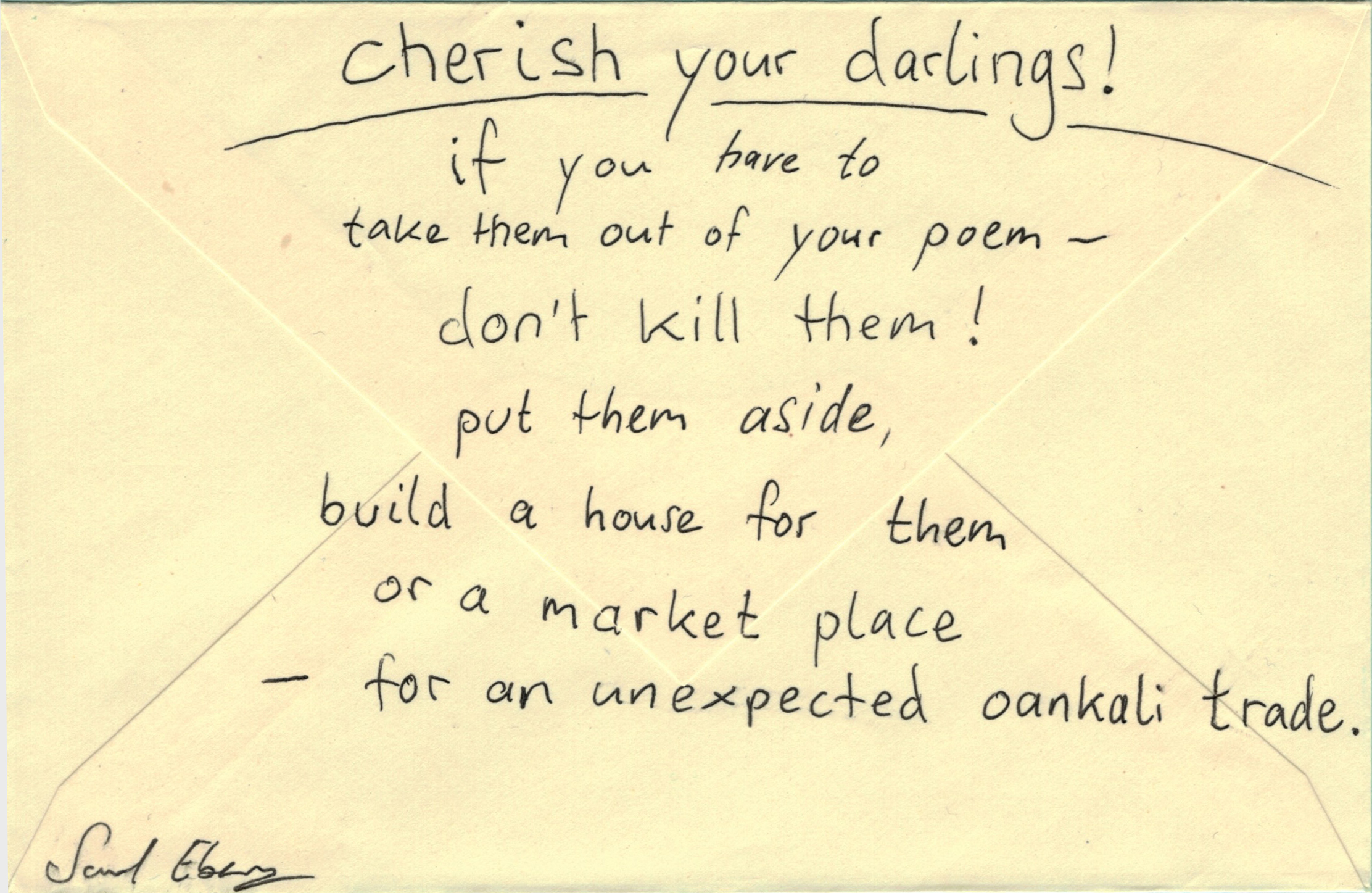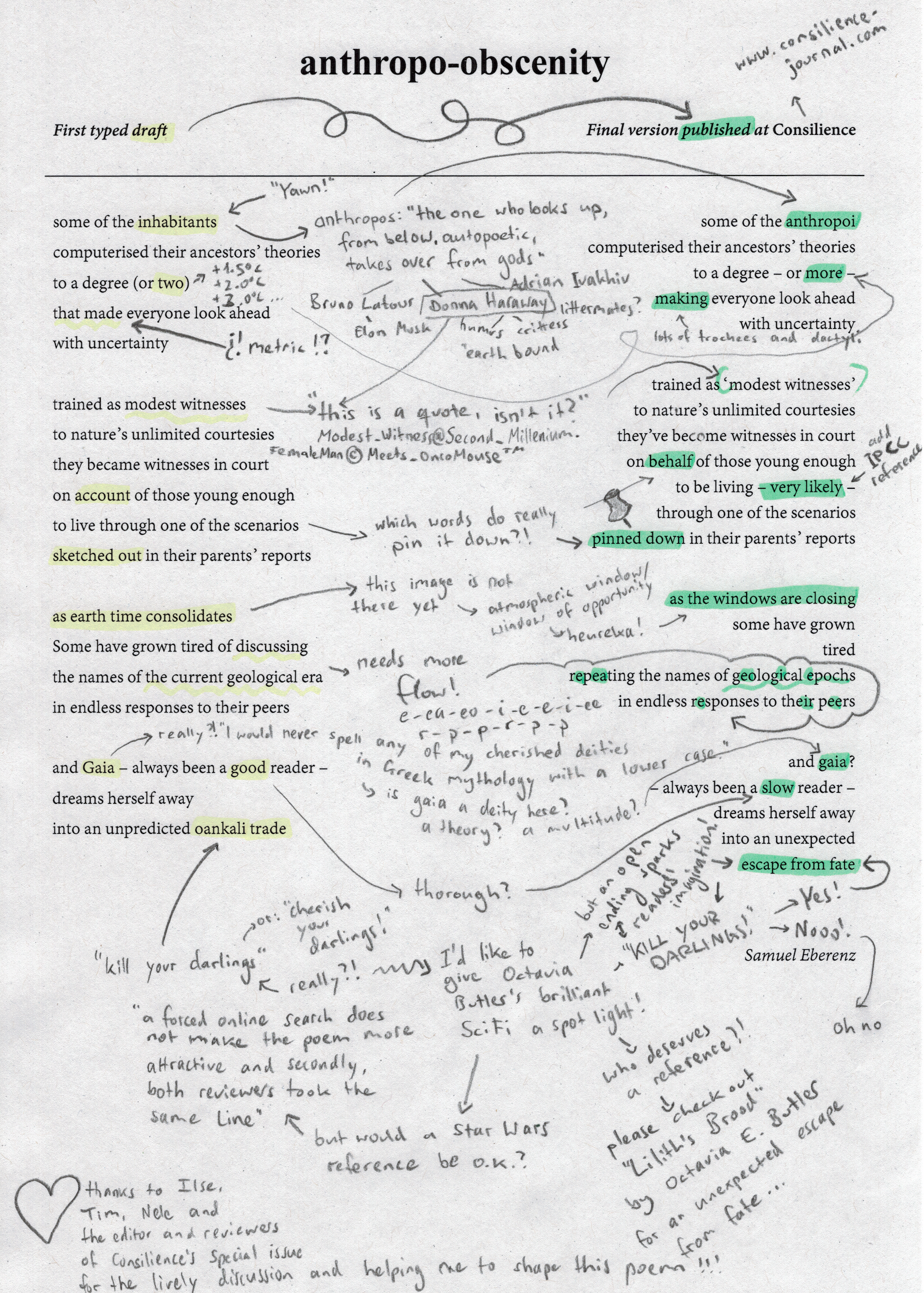22 April 2021
#RhymeYourResearch: anthropo-obscenity
Posted by Shane Hanlon
#RhymeYourResearch is a series of posts by poets who write poetry about science and explain their process and inspiration while also showcasing their pieces. Learn more about contributing. This week, Samuel Eberenz.

“Cherish your darlings.” Credit: Samuel Eberenz
As an oceanography student, I got to experience the unique beauty of Antarctica and subpolar biodiversity hotspots named Inaccessible, Gough, South Georgia – while dropping expendable bathythermographs and taking water samples to document the incessant warming and acidification of the Circumpolar Current. As a PhD student, I developed risk models that help us estimate the costs of weather and climate extremes. More and more, I had to face the shadows cast on our shared future by anthropogenic climate change. These shadows are much longer than I could ever imagine. Facing eco-anxiety all around and inside me, writing and exchange with others is one way that helps me to keep up hope and keep moving.
I wrote “anthropo-obscenity” in response to the call for the special issue on Geophysics by Consilience Journal and the AGU. The initial idea was to write a condensed reflection on the exposed situation many climate scientists have found themselves in ever since climate change became a burning topic in politics and public debate. At the same time, I’ve been fascinated by post-human narratives such as those brought forward prominently by Donna J. Haraway, and by the rich and surprising SciFi of Octavia E. Butler. From the first outline to the final draft, these influences shaped both content and the feel of my poem. It is especially the last stanza that poses with richer imagery and glimpses of irrational speculation than the first parts of the poem – moving beyond the realms of natural science. In fact, the canonical scientific climate projections for the 21st century are frequently criticized for being too conservative, disregarding the possibilities of discontinuities in global warming due to tipping points in the climate system – not because these tipping points do not exist, but because their timing and likelihood cannot be quantified with enough evidence (read for example Lenton et al., 2019 and Lloyd et al., 2021). When it comes to future scenarios, SciFi – at its core – is free to be much more speculative than science. Also, fiction can dare to propose that there might be escapes from our and earth’s interlinked fate coming from far outside what we’ve experienced and measured so far – as in the case of gene-trading oankali scraping the human leftovers off the globe’s surface after a nuclear catastrophe in Butler’s trilogy Lilith’s Brood.

Revision process for “anthropo-obscenity.” Credit: Samuel Eberenz
From the first draft to the published version, “anthropo-obscenity” was discussed with my friends Ilse, Tim and Nele, whose contributions to the content, imagery, rhythm, and language shaped the poem to what it became. Later on, in the peer-review for publication in Consilience Journal, the reviewers strongly suggested changing the last line and thus removing the explicit reference to Lilith’s Brood. With a heavy heart, I bowed to their arguments – mainly to make the poem more accessible for a wider audience. Still, killing my darling ‘oankali trade’ somehow feels like treason to one of my favorite writers. But make up your own mind! The image published here highlights and comments the changes from the first typed poem draft to the published version of “anthropo-obscenity”.
-Sam Ebernez strives to make climate science accessible to society. As a poet, he embraces the inaccessible and the uncertain – overconfident that there is immeasurable significance in vulnerability. He has published poetry in armarolla, eXperimenta, and online. Sam is also the co-founder of the Lab of Im_possibilities and LitUp!. You can follow him on Twitter @SamuelEberenz. “anthropo-obscenity” was published in 2021, you can also listen to the poem on SoundCloud.
anthropo-obscenity
Samuel Eberenz
some of the anthropoi
computerised their ancestors’ theories
to a degree – or more –
making everyone look ahead
with uncertainty
trained as ‘modest witnesses’
to nature’s unlimited courtesies
they’ve become witnesses in court
on behalf of those young enough
to be living – very likely –
through one of the scenarios
pinned down in their parents’ reports
as the windows are closing
some have grown
tired
repeating the names of geological epochs
in endless responses to their peers
and gaia?
– always been a slow reader –
dreams herself away
into an unexpected
escape from fate


 The Plainspoken Scientist is the science communication blog of AGU’s Sharing Science program. With this blog, we wish to showcase creative and effective science communication via multiple mediums and modes.
The Plainspoken Scientist is the science communication blog of AGU’s Sharing Science program. With this blog, we wish to showcase creative and effective science communication via multiple mediums and modes.